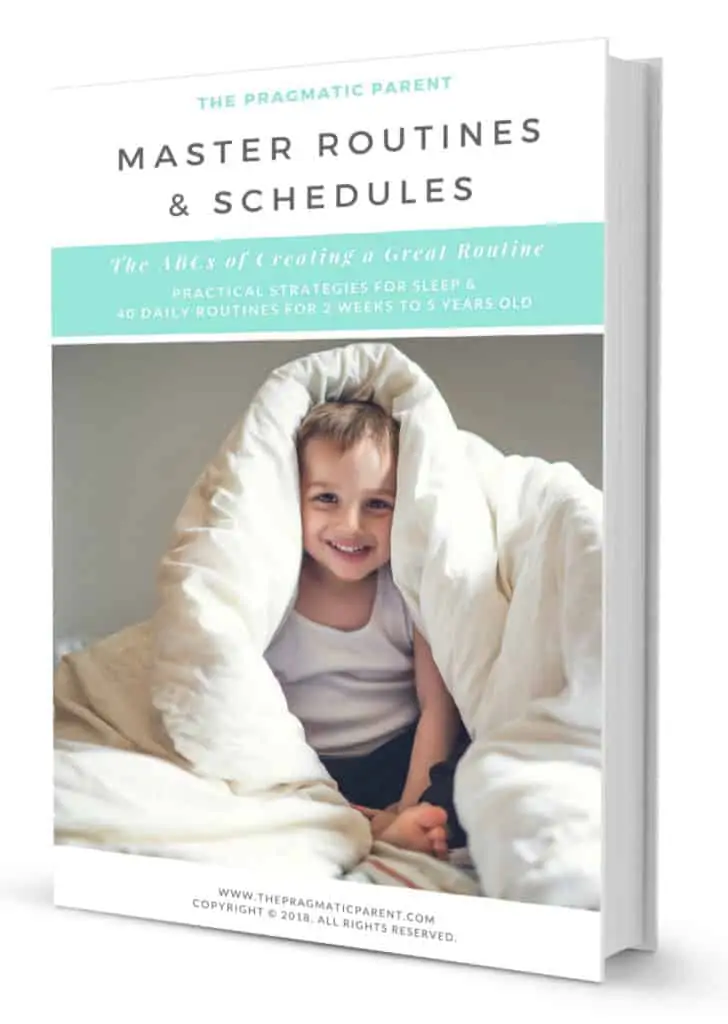Newborn babies have a hard time distinguishing between daytime and nighttime and are growing at a rapid rate, which explains why newborns sleep and feed around the clock for the first few weeks of life.
Everything you need to know to get your newborn to sleep often, and well. You can start teaching your baby the difference between night and day, help him relax before sleep times and get a jumpstart on fostering healthy sleep habits with these 10 gentle ways to help your newborn sleep with these smart and proven baby sleep tips
Top 11 Expert Baby Sleep Tips for Newborn Sleep
1. Swaddle Your Newborn to Soothe Them to Sleep
Babies are born with a startle reflex, which means they startle due to the sensation of falling. This causes sudden, jerking movements which in turn, makes them wake up. If you’ve seen a baby jump in their sleep and their arms jerk upwards, this is the startle reflex.
Babies are born with this startle reflex until it gradually goes away around 4 months. Using a swaddle keeps a baby snug and prevents waking up from those jerking movements. The swaddle is a big comfort to babies who were snug in the womb and once they’re born, find comfort in the familiar sensation of being wrapped snugly, yet safely.
I love the Aiden & Anais muslin swaddle blankets but also used the Love the Dream SwaddleUp which was amazing for my daughter who loved sleeping with her arms near her head, but still gave her the snug sensation and helped tremendously with sleep.
2. Cluster Feed in the Evening for Quality Newborn Sleep
Fill up your baby in the evening by feeding him more frequently than he does in the daytime. This will help to “top off his tank” and encourage him to sleep for longer stretches at night on a full tummy.
3. Dream Feed Before You Sleep
Help your baby stay asleep longer by doing a dreamfeed right before you go to bed, and while your baby is sleeping. This works whether you’re breastfeeding or bottle feeding, but the process means you gently pick up and feed your baby who is already asleep, and put back in their cot afterwards. This can help stretch out sleep periods and when you’re about to go to sleep yourself, you get a little more rest before the next feeding cycle begins.
4. Use White Noise
A baby can easily be startled from sleep by outside noise – a barking dog, the doorbell ringing, your netflix show or older siblings playing during nap time. A white noise machine masks all this noise and makes it easy to fall asleep and stay asleep.
You can use a fan on medium speed in your baby’s room or a white noise machine which comes in hand when you travel and need to bring white noise with you!
5. Wear Your Baby
It’s easy to spend days on end holding your newborn and soaking in as much of that sweet baby smell as you can, but at some point, you’re going to need to be hands-free to prepare meals, brush your teeth, even wash some dishes. Investing in a comfortable baby carrier or baby wrap can keep baby close and you hands free!
Being close to Mom and Dad is also a big comfort and bonding experience for baby and parents! Babies like to be held snuggly (and it’s a great solution for fussy and colicky babies) and while this isn’t a permanent sleep solution to sleep, you will be able to ensure your baby is getting good rest during those first few weeks (even months) this way.
I used the Ergo Baby carrier from newborn to four years old!
6. Head Outside for a Walk
Taking a daily walk and getting fresh air has been found by Liverpool John Moores University to help your baby synch with their circadian rhythm sooner (you know, sleeping at night and awake at daytime.)
The study has also found that babies who are exposed to plenty of natural light in the afternoon, whether you go for a stroll in the stroller or lay out a blanket in the backyard or nearby park, will sleep longer at night.
7. Keep it Light in the Day and Dark at Night
While you head outside in the afternoons for natural light exposure, you can also help your baby’s circadian rhythm by pulling open the blinds in the morning and keeping your house as light as possible. At naptimes and bedtimes, pull them closed again and make your home and rooms dark.
Newborns are born with mixed up days – wanting to stay up at night and sleep during the day. You can gently help them naturally correct their rhythm by exposing them to sunlight during the day and darkness at night.
If it’s Summer in the evenings, close the blinds and dim your lights to help stimulate nighttime to help re-set your baby’s rhythms and help your baby learn to sleep for longer stretches.
8. Help Your Baby Relax
A baby who is relaxed and calm is going to fall asleep easier for naps and bedtime. Try your hand at infant massage to help your newborn slip to sleep quickly. You can start with a warm bath after baby’s umbilical cord has fallen off, and then gently wash your baby in warm water and give her a gentle massage afterwards. Follow the massage with a feeding and your baby will drift right to sleep.
9. Be Strategic with Diaper Changes
Change your baby’s diaper BEOFRE you feed him. Once you feed your baby and he’s getting sleepy from having a full stomach, the last thing you want to do is change his diaper and wake him up completely.
Instead, change your baby, re-swaddle him, and then feed him before you put him back to bed. If your baby does not have a wet or dirty diaper, skip the diaper change all together and move straight to feeding your baby.
10. Sleep with Your Baby Nearby
Room sharing can be a huge comfort to baby – and Mom too! Room sharing means you keep your baby in a small crib, in reach baby bassinet or infant cushion like a Dock a Tot nearby at night. It makes night feedings more convenience, and research shows that babies who sleep near their parent, are shown to sleep better as well as helping to lower the risk of SIDS.
The American Academy of Pediatrics (AAP) recommends room-sharing as the best sleep arrangement for baby in the first few months of life.
11. Put Baby to Sleep When They’re Tired
The keep to good sleep is putting your baby to sleep when he’s tired, not overtired. While it may seem counterintuitive, an overtired baby will fight going to sleep and when they finally do, are restless and prone to more waking and shortening their naps.
Learn your baby’s sleep cues so you can get ahead of sleep before it’s too late. The more consistently your baby naps during the day, the better he’ll sleep at night. A newborn baby, and even 1-2 months old baby is up every 1-2 hours all day and night long, trying to keep him up longer during the day will make sleep even worse.
Newborns are only able to be awake for short periods of time (no more than 45 minutes on average), so the first few weeks of your baby’s lives will mostly be spent sleeping until they make it past the major 6 week growth spurt and start stretching sleep for longer lengths of time.
PS – Speaking of baby essentials… here is a list of free baby products for Moms and baby, when you use the coupon code PRAGMATIC1. These baby essentials are totally free (you are responsible for shipping & handling only). Need a hooded towel for bath time, nursing pillow, carseat cover, pregnancy pillow or baby wrap? Check out all your freebies here
Super Resource to Mastering Naps, Great Sleep Habits & Your Daily Routine

Learn how to start the process of creating a routine, establishing wake up and bedtimes, strategies for working through nap transitions, prepping for daylight savings time to keep your routine on track and logging your baby’s sleep patterns to rocking a solid schedule through every age of growth.
Want even more?
Shop All Parenting Resources
Shop all of our parenting resources from self-regulation tools and managing big emotions to building self esteem and confidence. There are resources for all seasons of life!









Wow what a interesting also useful article it is. I really appreciate with your all tips these are you recommended here about baby sleep. Me and my wife sometimes getting tried about baby sleep. But after read this article i am too excited to apply it on my baby.Hope so it will work for us. I just love yours ideas. Thanks for the sharing such kind of informative also helpful article.
Tips are quite impressive.
As I can relate with the 6th tip My baby was also always like to get into gardens. as he is teen now this post has made me remind those days.
Thank you so much dear!